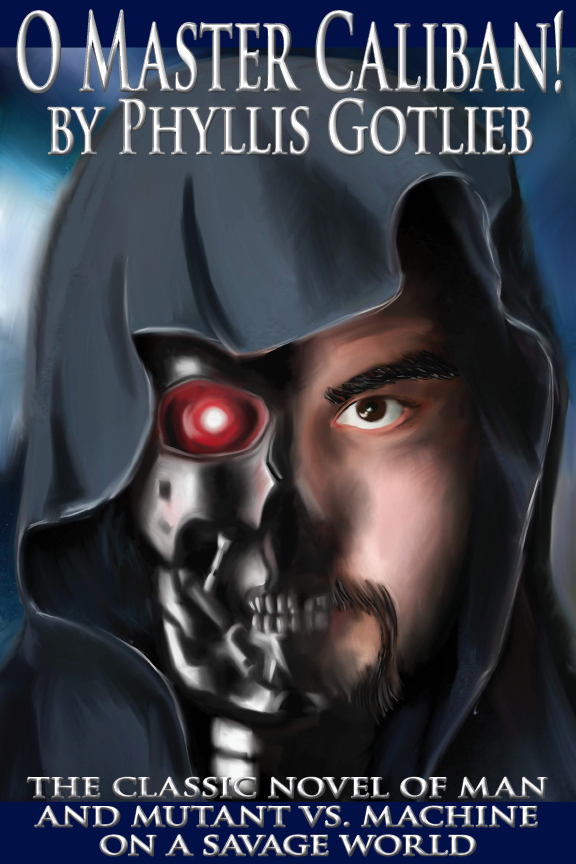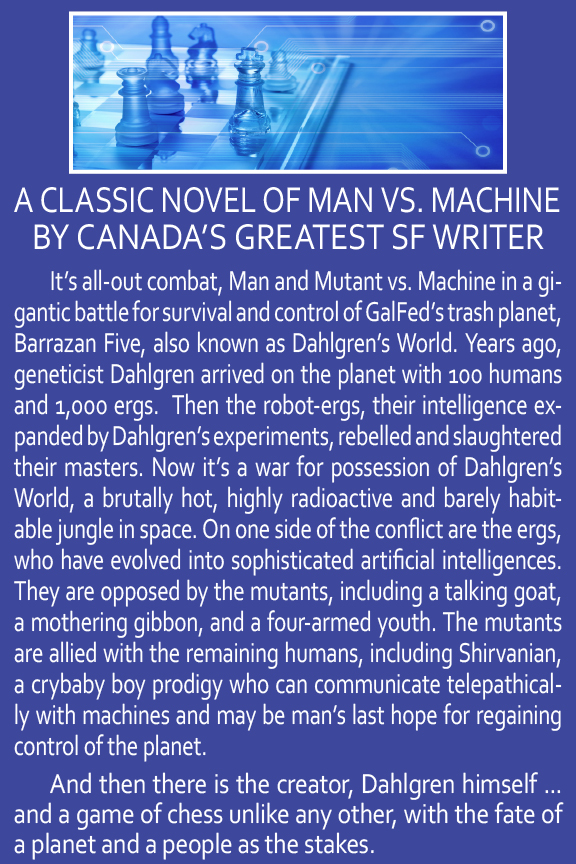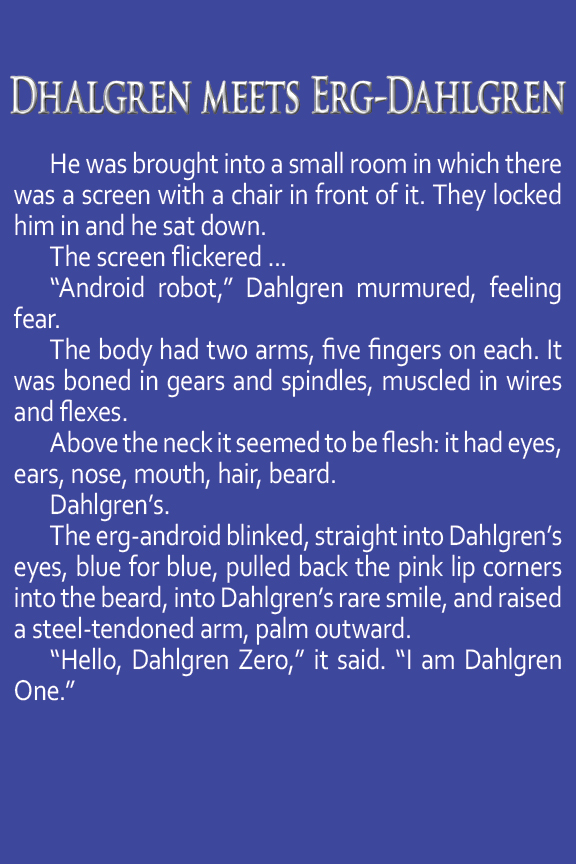O Master Caliban
Authors: Phyllis Gotlieb






IN THE EVENING
the
winds came and the rain swept and paused, swept again in a sheet of muddy drops, slowed and stopped. The giant ferns whispered, shook water from their fronds and dropped their spores. The air was green.
Yigal stared dreamily through the window and watched the sporefall, eating cabbage leaves, but Esther had made rabbit stew with carrots and fiddleheads for herself and the boy. She thought he looked moody, and she sat on his shoulder, lifted the bowl to hook chunks out with her long black fingers and coax them into his mouth. “Eat, darling, eat, sweetheart.”
Yigal turned his head and snorted. “Leave the boy alone.”
Darling Sweetheart, who by his own reckoning was nineteen years old, at least two meters tall and over a hundred and forty kilos in weight, grinned and said, “Mutti, I really am old enough to eat by myself.” He picked her off his shoulder and set her on the table.
“Then eat.”
He stirred the bowl with a finger.
“What’s the matter?”
He found the ladle and took a dipperful. “How much longer do you think we’ll have here?”
Esther trembled. She hated his bitterness. “How would I know?”
“The ergs haven’t come by for a week ...”
“I don’t care if I never see another one.”
“But they’re coming closer ... they’ve moved out past Zone Red, built a factory.”
“Why not? They’ve got the whole planet.”
“They’d have to start surveying all over again in the wilds. Maybe they will now. That was one of their last few inhibitions.”
“How did you find out about the factory?”
“I scouted.”
She slapped his face. Stew splattered the table and floor. She jumped down and backed against the wall. She weighed approximately twenty kilos. He looked at her sadly, without moving. “I am old enough, Esther.”
Esther, who could not cry, grabbed a handful of dry moss from a bin and wiped up. She jumped back on the table and kissed him.
He grinned. “That makes it better.” Then the corners of his mouth turned down. “Do you think he’s—somebody’s sending them out?”
“I don’t know,” she whispered. It was an old question. “Don’t think about that.”
It was dark. The wind blew in a drift of spores that turned brown when they touched the dry surfaces.
“I am going out,” Yigal said. He sounded touchy.
“Stay in tonight.”
He sniffed. “You know how I hate all this emotionalism.”
The boy forestalled Esther. “We’re through for the night. Stay in or go out as you like.”
“You’re getting very bossy,” Esther said. The tone of her voice suggested she was glad he had livened up.
“I don’t want to give orders or take anybody else’s.”
“You sure you’re through for the night?” Yigal asked on a rising note.
The wind strengthened again, and a sound rose above it.
“Tomorrow we put up the shutters,” said Esther. “Winter’s earlier every year.”
“That’s not a storm,” the boy said. “Put out the light.”
A glow grew at the window. Through it they saw fire sweeping the sky above the ferns, trees, and dusty cloud rack.
“That’s a ship landing at the station,” said Esther.
“Too far west.”
“Then they’ve built another landing field.”
“No, they haven’t! It’s going to—it’s going to—”
It crashed. Thunder and flame burst in the pit of the wilderness.
“I’m going to see,” he said.
“No, don’t, Sven! It must be an erg ship!”
“It didn’t come from the east.”
“Nobody can be alive in that.”
“There may be, I’ve got to find out.”
“The ergs will get it!” But he was gone.
“Wait!” Esther clapped the lid on the stewpot, picked up the lantern, and jumped on Yigal’s back. “Come on!”
“I don’t want to go out there!” Yigal bleated.
“You did a couple of minutes ago. Get going!”
* * *
Past the hutches, through the cabbage patch, beyond the brick road. Wind howled and whirled; the lantern blew out; muddy drops stung, and jungle vines and tendrils caught at them; the boy wrenched and broke them with all four hands. Yigal’s curses were carried off by the rushing air. Sven did not know much about ships, but he was thinking that the explosion had not been as great as he expected, and the fire was subdued. It seemed the fuel tanks had not burst, and the flames among the trees were already sputtering out in a dim circle.
They stopped at the edge of the burned clearing. The wind died; a nightbird croaked and a thousand insects whirred and twittered.
The ship was standing.
“Is that a ship?” Esther asked. “It’s only a little thing.” She had seen just one in her life before.
The undercarriage had been driven into the ground like a peg; the plates above it were crimped and puckered, still hissing with heat in the damp earth.
“Some kind of scout. The engines must have cut before it hit.”
As the flames went down the outline dulled to a dark tower.
“We’ll have ergs here in half an hour,” Yigal said. “Come on back.”
Esther lit her lantern with a flint striker and handed it to Sven; it lightened a patch of dull gray metal and showed mists creeping among the trees and ferns and pausing at the heated area like cautious animals.
“I can’t even see the door,” Sven said. He circled the silent bulk. “Halloo!” he roared. The noise bounced off the ship and died in mist and leaves.
Esther was jittering. “It’s a robot, or everybody’s dead. Let’s go.”
“Hold this.” Sven handed her the lantern and bent down to wrench at a rotted stump. It came up with a smack of mud. He jumped into the fire-circle, raised it above his head and hurled. It bonged against the metal and he yelled again. The only answer out of the mist was a distant ring and clatter in the east.
“Ergs!” cried Esther. “Sven!” She jumped up and down on Yigal’s back, swinging the lantern and setting off curses.
“Will
you get that damned thing away from my ear before you set me on fire!”
“One more try.” Sven picked up a piece of the stump, which had split on the metal. Before he could throw it, a little door opened halfway up the ship and a cluster of faces pushed out into the orange light.
“Hello!” he called.
A voice wailed, “I want Mama!”
Sven blinked at the faces. “My God, it looks like a bunch of kids!”
Yigal’s head jerked up. “Whats?”
Esther grabbed one of his horns and swung down. “Children, you old goat!” The clangor of racing machines swelled toward them. “Sven, there’s not much time!”
Sven planted his lower hands on his hips and cupped his upper ones around his mouth. “Anybody hurt up there?”
“No,” said a quavering voice.
“Where’s your pilot?”
“There isn’t any. This is a robot.”
“You got a radio?”
“Everything’s gone but light and air.”
“Then grab what you can and get out!”
“Why should we? This is our ship!”
‘When those machines get here there won’t be any ship, or any you either! Get out!”
“Who do you think you are?”
“The only friend you’ve got! Hurry!” Sven would have been dancing with fury if his feet hadn’t sunk in the mud. Ten more seconds and he’d leave them,
I want Mama
and all.
A boy poked his head out. “There’s no ladder here.”
Somebody else, a girl, said, “Look in the goddam locker, you idiot!”
“Find me a light, you clothead, and I’ll look!”
Sven pulled at the nearest exterior handhold and the hot warped metal broke.
Esther snarled, “I wish you brains would learn to use your big fat heads.” She swung up to Sven’s shoulder and from the platform of his four raised hands leaped and caught the rung just below the opening. She reached down for the lantern, raised it, and leered at the five gaping faces. “Monkey see, monkey do.”
Sven called, “Clothes and medicine, all the anti-rad and radiation counters !—”
“You hear?” said Esther. “Throw those suits away, we’ve got plenty of air for you. Lots of rain too. What’s the matter, scared out of your wits? You’ll find me beautiful soon enough. Come on, you’ve got five minutes!”
But it took them longer, perhaps because they were numbed by shock or fear, or because they were being ordered about by a black gibbon, splotched with orange and turquoise, who spoke perfect
lingua.
Before they were ready the treads were crunching broken branches and young ferns into the mud.
“Esther ...” Sven whispered, half whimpered, like a child, and hoped she did not hear.
She heard the ergs. Yigal neighed and trembled.
“Be still,” she told the children, and jumped down.
The two ergs rose three times Sven’s height: the ship was not much taller. They were complexes of whirling arms, glittering sensors and branched antennas. They stopped twenty-five meters from Sven, had never at any time come closer, as if there were a shield about him.
One of their last few inhibitions.
They had lost so many.
They flickered, blinked, beeped; their arms clanged; but they stood.
Sven licked his lips. “I want to get the kids out, Esther.”
Inside the ship a girl yelled, “Get away from there!” and there was a slapping sound, twice repeated.
The youngest child, a boy of about ten, screamed,
“I
want to see the robots! I want to!”
Slap!
The boy screamed in rage.
And the ergs began to move in.
Slowly, by half a meter in ten seconds, then faster; faster again, five, ten, twenty meters ...
Sven and Esther stood motionless; Yigal got down on all four knees and shoved his face in the dirt.
The boy pushed head and shoulders out of the opening and craned to look at the monsters. He grinned. “Yaah!” he yelled.
The ergs shivered, rattled, backtracked so fast they crashed into each other and caromed away, slithering in the mud. Backed to the limit.
Sven stared at the small grimacing face. His mind was stupid and empty. He passed a pair of hands over his head to wipe the sweat off and said, “Come on.”
When they were out of range the ergs moved in, lifted the little ship in their arms like pallbearers, and trundled away.
“They’re taking our ship!” the child yelled.
“So they are,” said Esther, wrapping an arm around him. “Aren’t you glad you’re not inside?”
* * *
Dahlgren’s World is the fifth planet of Barrazan, a piece of real estate bought by Galactic Federation from the Barrazani system for use as an experimental biological station. It was going cheap because it had never been quite right for settling and was littered with the ruins of failed colonies. It blew with dust clouds and rainstorms, stank with jungles, swarmed with diseases; the polar icecaps were small because of the dust cover, and the seas were poisonous. It neither grew nor attracted intelligent life.
GalFed cut out a triangular swath of jungle at the equator, the shape of an arrowhead pointing east, one hundred and fifty kilometers from apex to base, base measuring about seventy-five; it replaced the diseased swamps with hydroponic tracts, controlled the more loathsome life forms, with exquisite care introduced plants, animals, bacilli and viruses from the equatorial regions of a hundred worlds comparable in size and gravity; it waited, weeded and replenished.
Barrazan V went on turning against its sun, almost as repellent as ever. Turn and turn; when the flora of a hundred worlds balanced and thrived, and their animals reproduced, GalFed sent down the biologist Dahlgren.
Dahlgren had hundreds of specialists and a thousand ergs. The great machines planted and reaped, mined and forged; what they could not do they created other machines to do, to see with the eye of an electron microscope, knot a thread that might only be seen by an electron microscope, cut out and replace the molecule of a gene.
At the tip of the arrowhead, aimed westward, Dahlgren’s ergs set an arc of five reactors to warp the life forms with radiation at measured distances and dosages. Beyond the arrow’s tip, as if it pointed to a significant dot on the landscape, they wrested shielded agricultural land to grow crops for dozens of civilizations, and built underground laboratories and living quarters because there was no comfortable place on the surface; here the specialists worked to modify genetic strains of their home species to live on that world and many others just as repellent, and waited to see whether creation or mutation would give them the answers first.
Barrazan V is not far, as space measures, from GalFed Central. Every few standard years Dahlgren came to Central Bureau to give progress reports; he grew gray hairs and lines, but life forms change more slowly, and no one expected answers within his lifetime.
Dahlgren’s World had a small port facility, and it was avoided by any crippled ship that could limp beyond it, possibly because of the fearsome atmosphere, more likely because of the intimidating size and power of the servicing ergs, whirring through the mists and windstorms. Years went by without a landing. The ergs were not lonely.
The little
Piranha,
a holiday cruiser despite its name, had no choice. It was a robot with an impeccable safety record, and when its communications went awry two days out from Barrazan IV its automatics took it to the nearest service station. Since it had no radar, it crashed.

